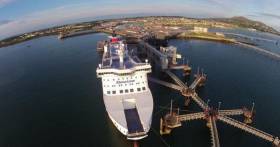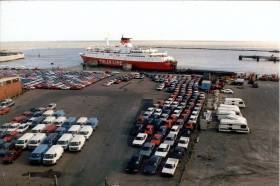Displaying items by tag: Not Ready
UK's Second Biggest Ferry Port of Holyhead 'Absolutely Not' Ready for a No-Deal Brexit
The UK's second biggest roll-on roll-off ferry port of Holyhead is from where Gwynedd Shipping operate and say they are "absolutely" not ready for a no deal Brexit.
Andrew Kinsella, Managing Director of the shipping company speaking on ITV News, (see: footage) says the infrastructure they need to avoid a backlog of lorries on the A55 is not in place and it is "implausible" that it will be in time.
Stena Line, the company who manage the port in Holyhead claim they "have taken all prudent steps" to prepare for a no deal Brexit.
Welsh Government have also said in the event of a no-deal, there are likely to be delays at customs but contingency plans are in place to minimise disruption.
Boris Johnson has indicated he wants a deal largely in place by October 11, the day the agenda is set for the European summit on October 18 when the Prime Minister is hoping EU leaders will sign off on an agreement.
Michael Gove, the minister in charge of no-deal Brexit preparations (yesterday) announced, "if the EU does not move this Government is prepared to leave without a deal on October 31."
For much more from the ITV News coverage click here.
UK's Port of Ramsgate 'Can Not Be Ready' for Brexit Ferries
#ferries - On the UK south-east coast, the Port of Ramsgate "can not be ready" for extra ferry services in the event of a no-deal Brexit, according to the councillor for the harbour area.
Seaborne Freight according to BBC News, has been given a £13.8m contract to run a freight service between Ramsgate and Ostend in the event of a no-deal Brexit.
However, Conservative councillor Beverly Martin says the harbour can not be ready by Brexit on 29 March.
The government said facilities will be open "as soon as practicable".
In a statement the Department for Transport said that "works are underway".
Ramsgate has not had a regular ferry service since 2013.
Seaborne's contract as Afloat previously covered, was one of three awarded to ease "severe congestion" at Dover, in the case of a no-deal Brexit.
The contingency plans allow for almost 4,000 more lorries a week to come and go from other ports, including Plymouth, Poole, and Portsmouth.
In total the contracts are worth £103m.
"From local knowledge, there is terrific concern that we [Ramsgate Port] can not possibly by ready. There isn't the width or the breadth of the berths that is needed to carry large ships," the councillor said.
"I don't see how, with the state of the harbour and the port and the number of repairs that are needed that it could be ready."
For more including the contract to Seaborne, click here.






























































